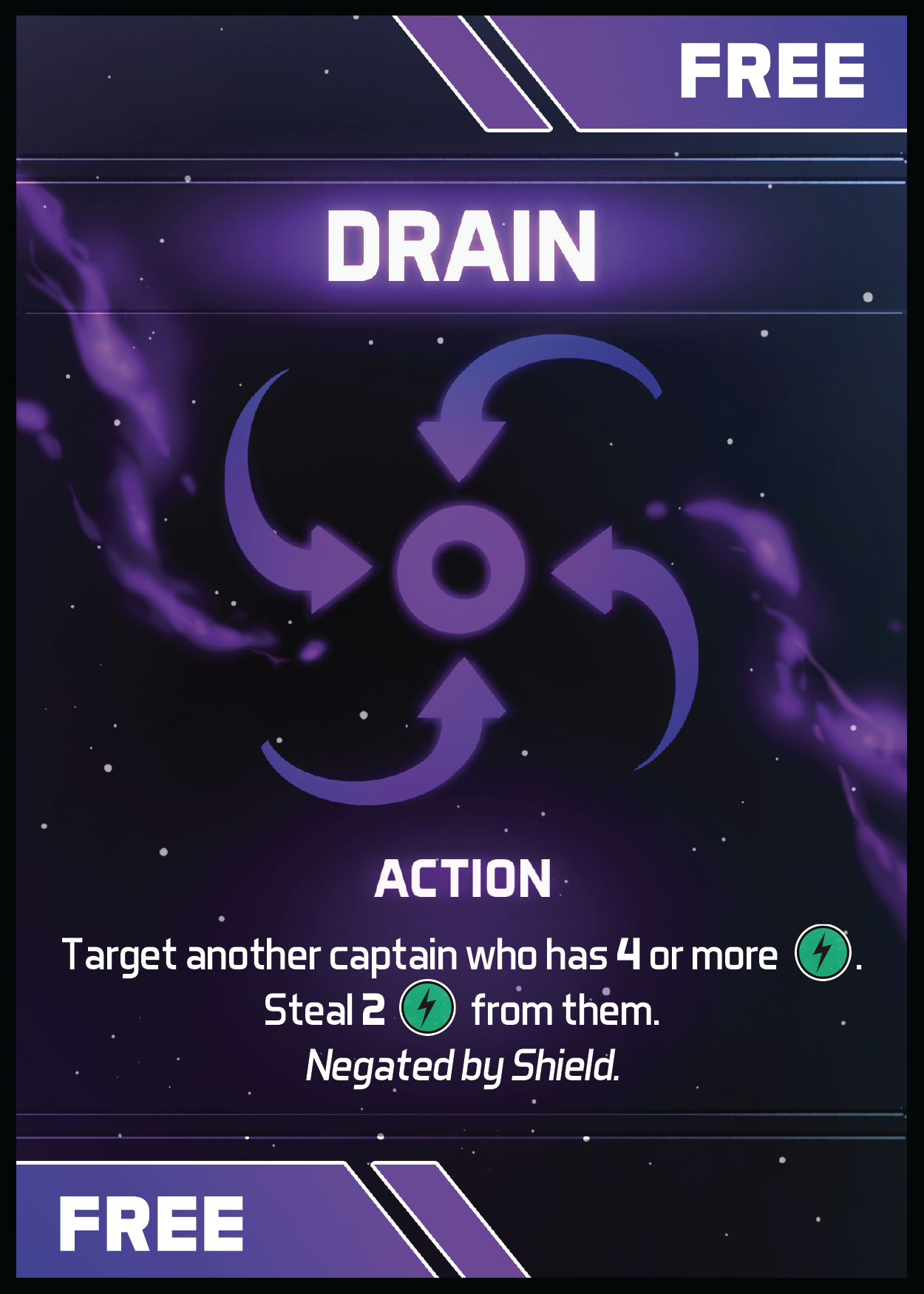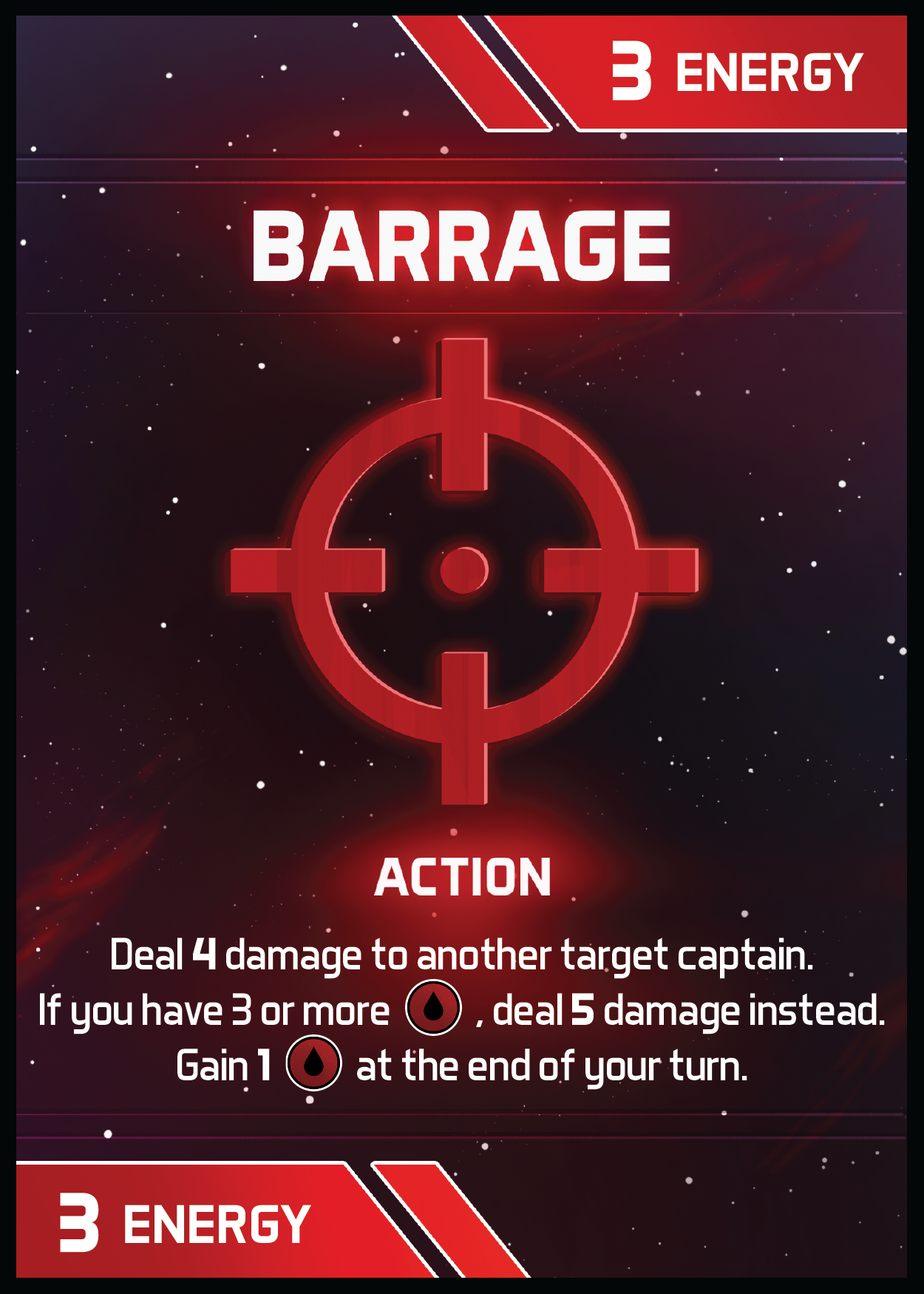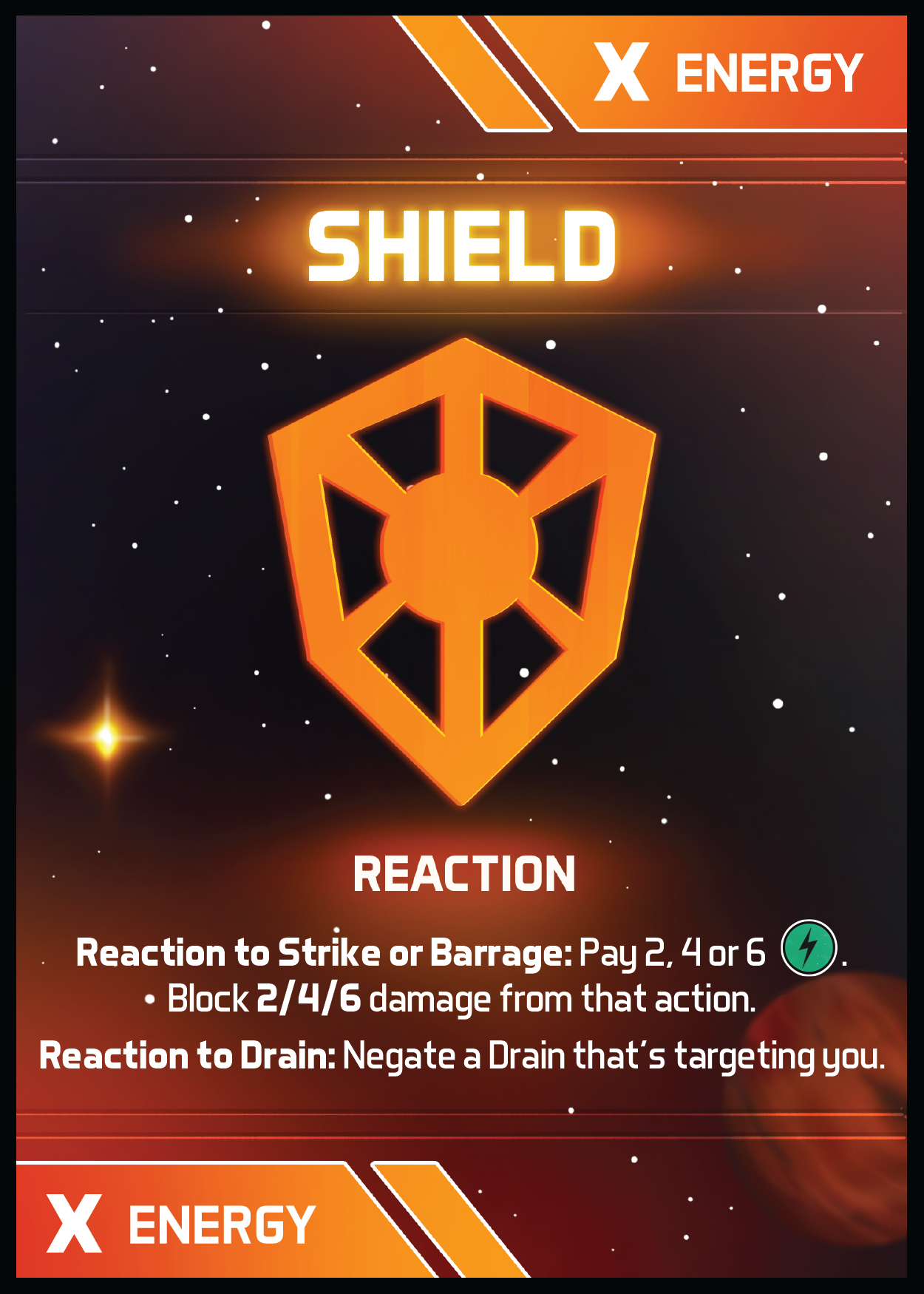Portia is the Ranger class of Captain’s Gambit. She’s the only character designed to identify, track down and kill captains of a specific type.
For context, contrast her to other assassins: Hamlet and Brutus target players using knowledge from before the game, and Othello targets players during the game but based on their playstyle. Portia, meanwhile, targets players based on a combination of their playstyle and their captain card.
To win, Portia must determine which players/captains yearn for blood. She must anticipate their goals and stay one step ahead in order to line up her shot before it’s too late.
Portia’s challenge comes in the form of her specific bounty. Unfortunately for her, the captain most likely to become her kill target is Iago. He specifically needs the most blood to win. Any other captain wouldn’t be a problem, but Iago is an ally captain, and as such has most of the galaxy wrapped around his finger. Very few captains want Iago dead, and he can quickly turn the table against anyone who shows aggression against him.
Between Portia and Iago, most captains will actually turn against Portia for trying to protect the galaxy, for trying to kill Iago. Most captains would rather achieve their shallow goals with Iago as their advisor than let Portia reach her objective and establish peace.
If Iago simultaneously gains allies and the most blood, forcing himself to be Portia’s only target, Portia will find herself in trouble and probably unsuccessful entirely.
Even if Iago is not in the game, other captains will impersonate him and make life difficult anyway. If you’re Portia, you’ll need a plan no matter who is at the table.
Luckily, you have a healthy toolkit of options when it comes to claiming your bounty. Once you understand how captain identities and blood management affects the table, you’ll find yourself seeing tons of opportunities each turn.
In lore, Portia’s claim to fame was cleverly navigating niche rules and technicalities to find victory. I haven’t read Merchant of Venice in a while but I think Portia also wields her trusty rifle to snipe high-bounty targets out of nowhere.
Anyway, Portia’s two broad approaches to victory are:
Correctly predict captain identities at the table, and bring them down before they become untouchable.
Prepare for sudden, unexpected victory opportunities (the Snipe).
Some captains utilize identity prediction as a core victory axis (Cordelia, Imogen, Lear). Some captains wait for sudden opportunities to leap ahead and win (Richard III, Prospero, Lady Macbeth).
Portia combines these axes and rewards you for doing both. The only problem is that focusing on one of these methods can sometimes detract from the other… so you’ll need more information than what you’ve learned so far to actually improve your games.
But now you’ve tread the groundwork. Here are three principles to begin your climb:
Know your enemies.
Always add more options.
Reserve a final gambit.
Know your enemies
No matter who you are, you probably want to figure out each player’s captain identity. But Portia has inextricable relationships with certain captains. For her, it’s particularly advantageous to analyse each player and determine their identities so she can either win from them or avoid certain traps with them.
Hamlet
In the early game, you may be able to snipe a win if Hamlet took the Bloody route to victory. If you identify and kill his target after he launches a few attacks, you can take the game right out from under him. After the earlygame, though, other captains will likely outpace Hamlet in the blood department.
Iago
A competent Iago is Portia’s #1 enemy. They cannot win a game together: if Iago has objectively the most blood, then Portia has no choice but to murder him. This immediately puts Portia into an underdog position, because most captains prefer the fair sadist over the false lawyer. After all, far more captains can win with Iago than Portia.
Your primary goal is basically to slander him. Ensure that nobody 100% believes a player who claims to be Iago, but without sounding so desperate that you give away your own identity as Portia.
To cast doubt on a player’s identity, paint him as Lady Macbeth instead of Iago - but be very careful to never allow that player to have a “potential” Lady Macbeth turn. For example, you’ll end up in a tough bargaining position if an Iago-claiming player is able to say anything like, “See, I could have won if I was Lady Macbeth”. Luckily many players really do want to impersonate Iago, so you wouldn’t be wrong or manipulative for putting a bit more zeal into your declarations that Iago is a liar.
Luckily, it’s mathematically difficult for Iago to consistently outpace Lady Macbeth or Titus for the first few rounds of a game. This means during at least the earlygame, Iago will be mostly tied with other captains who like blood. This gives you a window to attack any of those three captains and secure victory.
During this earlygame, drop Iago to moderate health before he starts sounding believable about his claims. If a 10-health Iago objectively secures the most blood, it’ll become quite difficult to convince the table to attack him. But if he’s at lower health, you at least have the social advantage of saying that he could be a Lady Macbeth who wants to heal first before Revealing. You might even be correct about such a claim.
Lady Macbeth
Lady Macbeth is your friend, though you are certainly not her friend. Her potential existence is your key to killing Iago, and it’s also your key to victory just in general. Once nice thing for you is that Lady Macbeth players tend to suffer from low health problems, meaning you can win by finishing her off if she makes an inopportune Reveal.
Your major advantage with Lady Macbeth is that, in order for her to win, she must make enemies. If you play your cards right, you will have an entire table of captains trying to kill Lady Macbeth, conveniently doing much of the work for you.
Things get difficult if Lady Macbeth agrees to let Iago get “one blood ahead”, because it closes off a kill-option for you while also allowing a powerful alliance to form. But you can stop this if you’re brave. Try impersonating Iago yourself and giving Lady Macbeth a false sense of security, to have her make a short-sighted Reveal. At the least you’ll get her confused between you and the real Iago, buying you a bit more time.
Puck
Puck is noteworthy mostly for being a poor ally choice with you. Puck prefers captains like Prospero who have an obvious Reveal with a controllable resource until that point (energy), or even a captain like Brutus who at least has an obvious kill target.
Meanwhile, Portia often has multiple simultaneous targets over the course of the game, and as an opportunist, you want to do the exact opposite of locking everyone’s health and waiting for X rounds. You can have fun with an aggressive Puck, but once Puck decides to speak openly and asks everyone to truce until round 12, you’ll have a very bad time.
Even if you plan to betray Puck, any actions you do to play along might ultimately hurt you in the long run. You can totally win with Puck, but you may have a tough time doing so.
Romeo/Juliet
Iago and Portia swapped sprites once I learned more about The Merchant of Venice.
Romeo and Juliet are somewhat of a blessing because they like other captains to be damaged, and will happily encourage violence at the table.
This means if they’re in the game and even partially competent, the table will tend towards the aggressive side of things, and many players will rack up blood regardless of their captain identity. Combined with the fact that RJ want people to die, and often have high blood themselves, you may find yourself at no shortage of targets to snipe.
Tactics-wise, if you develop a theory regarding who is Romeo or Juliet, you may want to keep theories to yourself for a few extra turns: Romeo and Juliet will naturally lower the average captain health around the table, giving you more targets to snipe - even if it means taking a few hits yourself.
Richard III
Richard has two axes towards victory: he wants captains to have low health, and he wants to have more energy than the mode average health value. You can take advantage of his propensity for shaving health down and use that to prepare yourself for a killing blow.
To scare him away from actually Revealing, try to negotiate one other captain into a safe health range. You could even Fortify them yourself.
Rosalind
If somebody openly declares themselves to be Rosalind - which is indeed a fine strategy these days - you can set up a nice kill provided she first attacks other captains for a bit of blood.
The beauty of you and Rosalind specifically is that, unlike Hamlet or Brutus who mark captains before anyone gives away their identity, you can always plan a victory with Rosalind. Hamlet and Brutus are stuck with whoever they marked before the game, but you’re free to pivot as you please. (Othello can do this too, but this isn’t about him.)
Viola
Viola is one of your few chances to kill Iago, as you can easily convince them to take Iago’s mask and assume his form. Even if the player declaring themselves as Viola is actually somebody like Juliet or Titus, this works in your favour.
Just get the killing blow on Iago to “help” your Viola friend, and— oops, you win! Sorry, Viola!
Imogen
Imogen is helpful because she damages everyone. She can also be your friend in many cases.
While Rosalind is “accidentally” helpful to your cause because many players will increase their aggression to counter her, Imogen’s Reveal itself represents a minimum level of reliable damage.
Combine her Reveal with your own Barrage for 7 clean damage to Lady Macbeth or Iago.
Titus
Titus, the ghost robot himself, is difficult and sad to fight. You will have a bad time.
The potential of Titus, however, is actually a blessing. The mere threat of Titus gives you social permission to be aggressive against bloody players. At any rate, the real Titus is probably okay with you attacking him into critical range anyway, which is kind of funny.
When Titus is in your captain pool, you have two options:
Kill Titus before he gets too much blood.
Identify Titus, then claim that a different bloody captain is Titus, and kill them instead.
Knowing your enemies is useful for victory, but this knowledge alone won’t be quite enough to help you win. Step two: how do you get those beautiful snipes going?
Always add more options
Correctly identifying each player’s captain identity is an integral part to Portia play, but only one part. The other major part is preparing the Snipe, a classic Portia move that often steals games out of nowhere.
You’ll know you’ve Sniped correctly when other players think you were super lucky, in the right place at the right time.
They won’t realize that you spent the last 4 rounds chipping away health, spreading rumors and preparing just one out of many potential kill targets.
The TL;DR version of “add more options” is to always look for potentially-bloody captains to bring to killing range.
But actually doing that isn’t easy, particularly when you have the chance of inviting other assassins to the kill, and particularly when prepping up targets for death makes you look rather conspicious yourself. A CG unspoken rule is to always keep your social image in check.
One of the best ways to add kill options is to recognize the threat of win options. For example, you can call out when another captain is acting an awful lot like Lady Macbeth. You want to be as proactive as you can to suppress bloody captains without giving away your identity.
Statements like “we should stop them from winning” are effective because plenty of non-Portia captains would reasonably make such a statement. You just happen to benefit more than other captains for making someone actually do something about that high-blood captain.
Adding options doesn’t always involve necessarily hurting captains, though a large part of your gameplay can certainly involve keeping multiple bloody captains low health.
You can’t exactly be proactive about all of these opportunities, but the following list will hopefully inspire you to keep an eye out for the right kinds of circumstances:
Encouraging low-blood captains to attack someone, even offering to Bribe them, so that they can bloody themselves and remain a viable kill target.
Draining Iago so he must spend an extra turn gaining energy. This puts him more in line with other captains, keeping your kill target options wider than Just Iago.
Encouraging an early Lady Macbeth Reveal under pretense of being a friendly captain.
Calling bluff on a bloody captain’s Shield to sneak in kill credit if they die.
Helping Viola get an early captain kill earlygame, when everyone is at 0-1 blood and you have a very high chance of winning from a 1-blood captain death.
Claiming to be Iago and using that as an excuse to bring other captains to low health.
Gain the most blood to distract other captains from thinking you could win from the second-bloodiest-captain’s death.
The key to consistently playing well as Portia is to keep tabs on the top handful of players and captains who are bound for bloodiness.
The more you try to “spread out” blood between captains, and the lower average health these captains have, the better odds you have of sneaking a win.
There are plenty of times when captains will exchange places with each other regarding who has the most blood and who is within a killing blow, and you want to keep a wide pool of options no matter who currently has low health or lots of blood.
For some reason, the specific mix of variables in Captain’s Gambit leads to games where Portia often only has exactly one chance to kill one specific captain before they fall out of range for another few rounds, or sometimes forever.
That’s why, in order to actually take victory, you’ll want to stay loaded as often as you can.
Reserve your final gambit
So now you know how to identify high-priority targets. And you know the importance of maximizing the number of high-priority targets in a game, while of course keeping your identity hidden.
The toughest part now is keeping enough resources on your end to snipe your targets when they wander in range. Everything else you do is a waste of time if you set up the perfect critical moment and discover you have no energy.
The most obvious point of leverage is to keep at least 2 energy in your reserves at all times (unless your opponents read this guide and use that to identify you). But energy aside, you have a handful of other elements you should also optimize.
Permits. Do you actually have a Barrage in your hand to finish the game?
Health. You may need to call several bluffs within the last few rounds, and you’re bound to lose a good number of them. But you only need to make one solid bluff call to bring a captain down to 4 health, so managing your own health is critical to give yourself multiple chances at a successful bluff call.
Blood. The jump from a 4-damage Barrage to a 5-damage Barrage is substantial, particularly because it’s so awkward to Shield. 3+ blood lets you snipe captains from higher health: you get 25% more damage on your Barrage, or 33% more damage on your Strike this way. That’s efficient!
Favour. Fostering goodwill with other players or captains can turn tides. Whether it’s a guaranteed Fortify, letting you save energy for a Barrage on your next turn, or it’s an actual alliance with Rosalind/Imogen/etc, building your relationships is the strongest way to ensure victory. It’s just really difficult to do.
You get the idea: keep resources on hand! Open up as many chances as possible to make a winning attack, and be ready to follow through when the time comes.
How to use each permit
Overcharge
Overcharge is an important, efficient way to keep your Snipe on-deck. Even before the winning moment, each Overcharge gives you +1ish more attack per game.
If you can avoid drawing suspicion, try biasing your Overcharge bluff calls against the bloodiest captains. If you successfully call Overcharges, you’ll slow these captains down by 1 round & any future rounds where they now must Charge instead of Overcharging.
Typically, the wisdom is to call out Barrages directly rather than Overcharges, but since your prime targets (Lady Macbeth and Iago) often prefer Strike over Barrage, you’ll have to prevent them from attacking altogether when you can.
Drain
Drain gives you energy while also slowing down other bloody captains! This is the alternative to calling Overcharge bluffs - just take the energy for yourself!
Since Portia can choose who to kill in the case of ties, it’s in your best interest to smooth out the average blood distribution among all captains. In the perfect world, all captains have the same amount of blood, and killing anyone would net you the win.
Well, the world isn’t perfect, but Drain helps. On that blood-smoothing front, Drain delays any captain’s blood ticker by exactly one round. That’s useful against Iago, Titus and Lady Macbeth, as well as outliers like myself (AC) who loves attacking no matter who I am.
Just keep in mind that Drain delays the next blood by 1 round. Captains can’t be drained below 4 energy, meaning they’ll always have a guaranteed +1 blood on their next turn if they still want to attack.
Barrage
As the case with most captains, Barrage is one of the more powerful permits to rest in your hand. This permit really gives you the edge you need to secure victory, and while it’s not absolutely necessary, you’ll find that most of your opportunities happen around opponents with 4 health.
If you don’t have a chance at grabbing a Barrage, all is not lost. Encouraging other players to attack certain captains (“I think you should attack purple because of their energy count”) lets you get away with a simple Strike in some cases.
Note that it’s pretty easy to bluff Barrage against captains with anywhere between 5-8 health, because it’s extremely risky to make a bluff call. Even if it’s the correct call, the social stigma of looking silly often prevents players from making bold moves like this. Make use of their apprehension to drop their health down while you prepare an alternative mode of murder.
Fortify
To be frank, Portia has little specialized use for Fortify. It’s useful to stay safe and give yourself a few extra bluff calls, and it’s useful for making friends or misdirecting attention, but that’s no different than most other captains. It’s not the worst permit in the world, though, especially if you can’t spend energy on Barrage and you don’t want to draw too much attention with a pile of energy.
Network
Use it to find Barrage. Haha.
Network is a key way to make choice bluff calls, and broadly speaking, to get a better idea of what other captains at the table may feel comfortable using.
For example, if you don’t see Barrages in the deck, this could be your chance to encourage violence. If you don’t see Drain, you may want to keep that Shield on you, hoard energy and silently goad players into attacking you.
As a low-attention permit, Network is also a great option for Portia to stall for a turn without either gaining suspicious levels of energy or spending her energy and losing her Snipe. Lots of captains benefit from the attention-dampening ability of Network, but Portia benefits from the dampened attention and the permit prediction and the dig for specifically Barrage, and the ability to slow her energy growth to a reasonable level.
Shield
Shield is fun for all assassins. The classic Shield maneuver is defending a choice captain from a killing blow, then turning around and smacking down that captain yourself for the win.
Because a skilled Portia player keeps multiple potential marks, you can sometimes make interesting plays where you disguise damage as helpful acts.
For example, if you Shield a target who is about to die, and that desparate murderous captain calls your bluff, your bluff damage might bring the original aggressor into kill range.
That method sounds convoluted, but a 2-energy Shield that leads to 3 bluff damage is a pretty solid deal in general. Plus, it minimizes suspicion if you attack the aggressor instead of the person you were defending. (I mean, if everyone reads this guide then it won’t minimize suspicion anymore, but the principle remains.)
Portia’s primary strategy in Captain’s Gambit is to do some reconnaisance, prime her targets, and prepare her campout for that all-important Snipe. That’s easier said than done, because there are myriad pathways to discovering each captain’s identity, to preparing her targets for death and even in preparing her source of damage.
Do you want to win? To maximize your odds, slow down bloody captains while encouraging pacifists to get their hands red. Bring as many targets as possible into potential killing range.
And finally, secure the resources you need to actually snipe whoever gets lots of blood and low of health. Unlike Hamlet who must orchestrate his victory many rounds in advance, Portia’s chances come and go on a turn-to-turn basis. To win, she must be ready to pull the trigger at any moment.
At a glance, Portia’s objective text alone doesn’t express the nuanced approaches you can take to win. When you play Portia, make sure you don’t underestimate her power, or the intricacies of her dynamic with other captains in the game.
Understand your enemies, increase your opportunities, and set up to take those fleeting chances when they come. Timing your actions is not easy, but Portia is prepared. Are you?

















